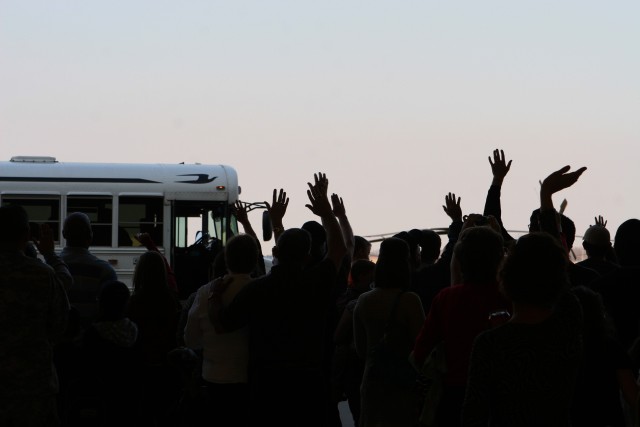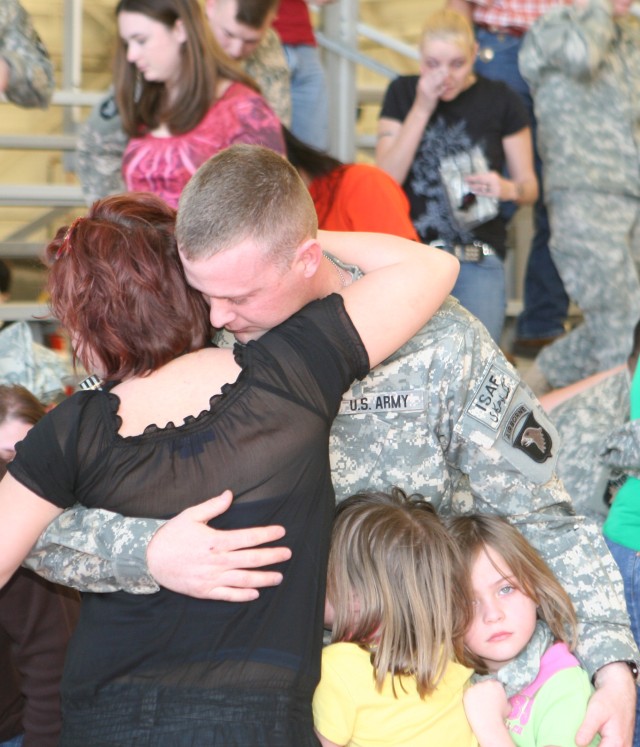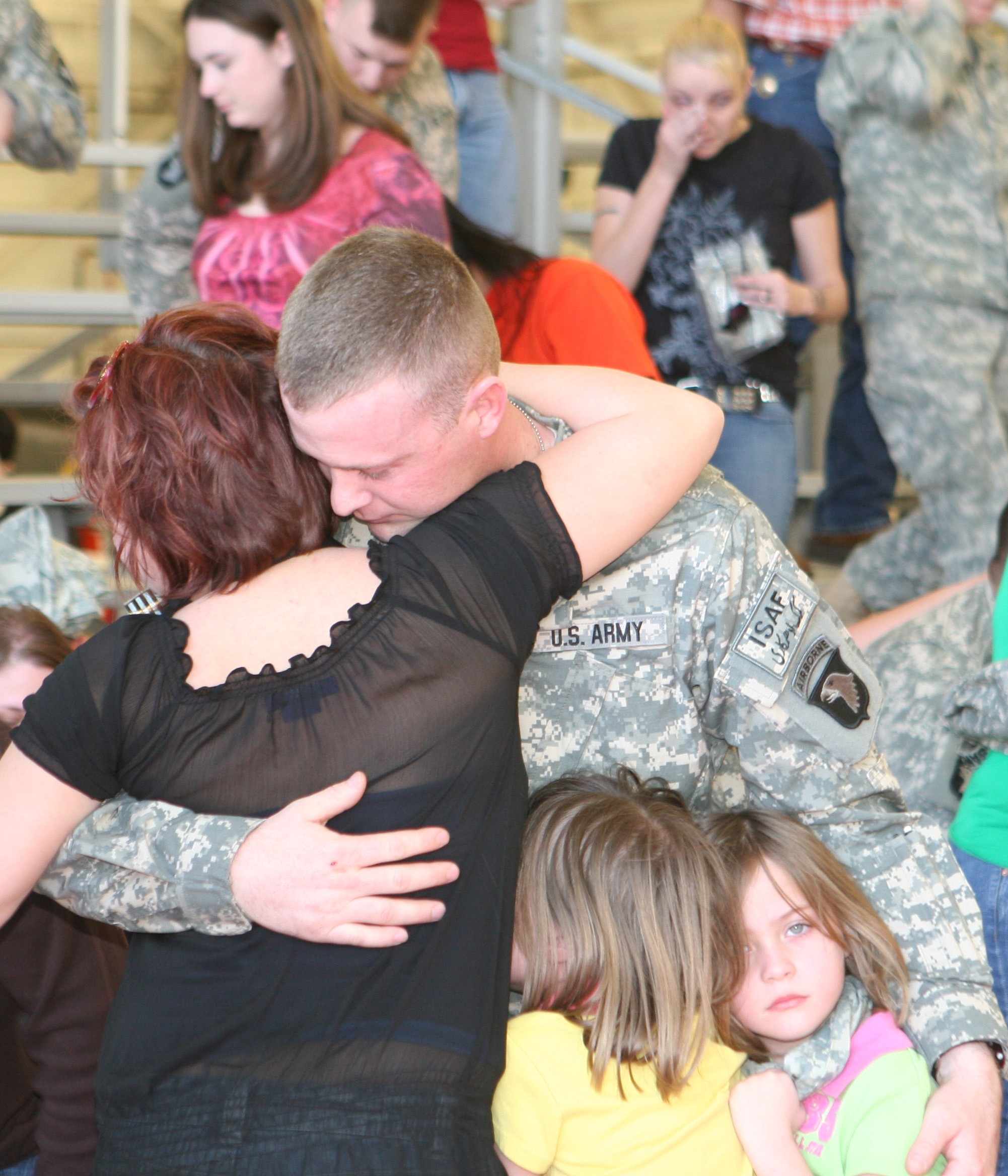FORT CAMPBELL, Ky. - Task Force Destiny began their second yearlong deployment to Afghanistan in support of Operation Enduring Freedom in March.
The brigade, consisting of approximately 3,000 Soldiers, replaced the 82nd Combat Aviation Brigade, 82nd Airborne Division.
Their mission is to provide aviation support to the Regional Command (South) and Regional Command (West), supporting the troops of U.S. forces, North Atlantic Treaty Organization forces, International Security Assistance Force and Afghanistan forces, said Col. William K. Gayler, TF Destiny commander.
In every capacity the brigade will be providing support to the Regional Command (South), Regional Command (west) and the ultimate goal of protecting the Afghan people, said Gayler.
This will allow for Afghanistan to enable their own systems to govern themselves, protect themselves and provide for their own people, he said.
In order to provide support to the overall mission of Regional Command (South) and Regional Command (West), the Soldiers of TF Destiny must be ready and trained to complete their individual mission or job.
The brigade provides a range of combat support consisting of resupply, troop movement, transportation and security of reconnaissance, said Gayler.
Soldier readiness is essential to the brigade's mission.
The brigade commander wants his Soldiers to be competent, confident and comfortable, he said.
"Competent at what we do, confident in their abilities and their leader's abilities, and comfortable in any environment under any situation because of their confidence," said Gayler.
Sgt. Charles Weaser, an Apache mechanic deployed with 5th Battalion, TF Destiny said he is confident in his abilities, as well as his units' ability to succeed in their mission because they were through extensive training. He participated in multiple gunnery training, high altitude training in Colorado, as well as environmental training in the California desert.
These training events were designed to simulate situations Soldiers will face in Afghanistan.
The training has prepared Soldiers physically and mentally for the environmental conditions of Afghanistan, said Weaser.
The TF Destiny commander acknowledged the resting of forces is just as important as the training of forces before their deployment. He does not want Soldiers to be tired while going into theater.
Leaders of the Task Force made a great effort to make sure their Soldiers did not spend too much time away from Families while training and preparing for this deployment, said Gayler.
Soldiers do not only have to prepare themselves for their deployment, they must also prepare their Families for their extended departure.
"Truly, any unit's success runs deeper than just whether or not those individual Soldiers are prepared," said Gayler. "We have a family readiness group structure and support from our local communities I have never seen before in my career ... they are truly phenomenal."
It is important for Family Members to be aware of the resources available to help them while their Soldier is deployed.
The Family Members of our deploying Soldiers have many structures, people and organizations that will ensure they are taken care of, which allows Soldiers to focus on their mission at hand, Gayler said.
These resources consist of Army Community Service, Family Readiness Groups, American Red Cross, Military OneSource, Army Families Online and the 101st CAB official social media pages: www.facebook.com/101cab, www.flickr.com/wingsofdestiny, and www.twitter.com/101cab.
There are also alternative support groups available if these do not suit you.
"FRG doesn't fit everybody, it may be your church or your neighborhood," said Michele. "Reach out to someone or something."
Support groups provided by the Army and brigade are great outlets to keep you informed and connected.
"Your imagination can run wild," said Michele. "Too much information is better than none."
Another great support system is fellow Army Families, because they can relate to your personal experience.
"I think the Army Family becomes your support if you allow it to," said Michele. "If you reach out and make that connection, it comes in and surrounds you before you know it."
The Task Force commander would especially like to say thank you to spouses, children, parents, Families and anyone who sees a loved one go into a combat zone.
"I really appreciate what they do," said Gayler. "They are the bedrock of this organization."
Each Family Member handles the burden of a loved one deploying differently.
"We take advantage of the time we have together," said Michele. "We try really hard to just live today and not sit around and think about what's going to come."
Even though some families have been through multiple deployments, they still experience difficulties.
"It doesn't get easier. It is still very hard," said Michele. "I think what I've learned for us is that the first month and the last month are the hardest."
Once the initial shock of the service member leaving has passed, it is easier to go on with a daily routine.
"You hit a rhythm, and you just go," said Michele. "You still are sad, and you still have times when you think 'I can't do this,' but then something happens and you move into the next day and you just keep going."
The endeavor is different for every Family Member. Although they all may experience the same sadness, everyone has a different way of coping.
Michele said her three girls all have a different way of handling their father's deployment, and that was something that she had to learn over time.
As children mature, they will handle each deployment in a different manner.
One crying hysterically is their way of coping while another shutting down completely and showing no emotion is their way, said Michele.
Even in times of weakness and hardship, Soldier's Families will come together to find their strength.
Military Families are the strongest type because of what they adapt to, said Michele.
Another factor which is very important to Soldiers and Families is communication. Soldiers having personal laptops and internet access can easily keep strong relations with Family back home.
It's more comforting to see your Soldier live on your computer screen while being able to have a real conversation, rather than written letters, said Michele.
As Family Members say 'farewell' to their Soldier, it is important for them to stay positive and informed. It will allow for the Soldier to stay focused on their mission, rather than worrying about their family back home so they can return home safely a year from now.
Even though you may feel alone, there are people who are trained, willing and available to help you through any difficulties you may face through this deployment.




Social Sharing